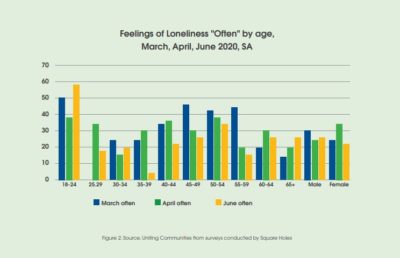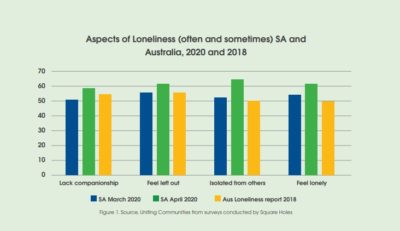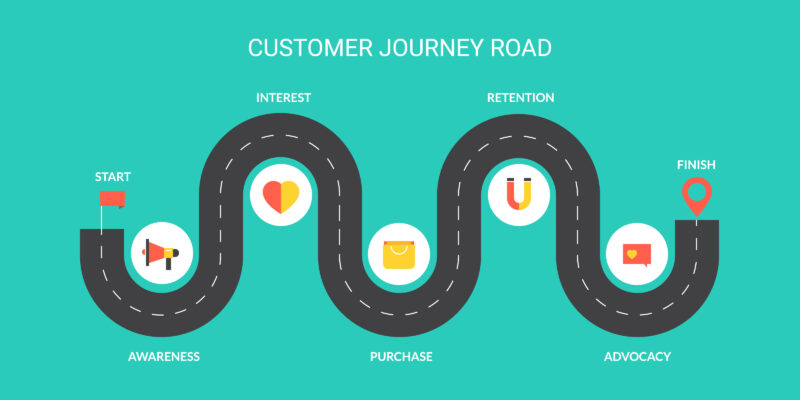Uniting Communities is a not-for-profit organisation aimed at reducing inequality and improving the wellbeing of disadvantaged South Australians through the offering of over 90 support services. With a solid understanding of the causes of loneliness, the organisation sought to gain insight into the prevalence of this issue in South Australia, as well as gathering personal experiences as a way to pinpoint strategies and develop important policy solutions and programs to help people overcome isolation.
Rachael Pearse, Uniting Communities Advocacy Project Officer, says that Uniting Communities believes the community needs greater opportunities to connect and more awareness of loneliness as a significant issue in our community.
“We identified loneliness as a significant issue in the community and in need of greater attention. One of our first steps was to conduct research through Square Holes into the extent of the issue in South Australia. We wanted to know how many South Australians were experiencing high rates of loneliness and what age groups were the most affected,” says Pearse.
The study revealed that 2 out of every 3 people (61%) felt lonely often (14%) or some of the time (47%) in South Australia during COVID-19 isolation. What was surprising for the organisation, was the outcome that the highest levels of loneliness were measured in the 18–24-year-old age category.
“Loneliness was an issue even before COVID hit. It’s just exasperated feelings of it.”
The study revealed that more than 3 out of 4 young people (78%) felt lonely sometimes (53%) or often (25%). Traditionally the organisation had focused on programs and outcomes for the 75+ age range, but as a direct result of this data, they extended their focus to the youth demographic.

“A specific outcome of this research is a shift in the age demographics we focus on in our workshops. For example, at our most recent workshop in March 2022, we focused on loneliness in young people and invited a number of researchers and speakers tackling this issue,” says Pearse.
“The research has also informed our public awareness campaigns, particularly most recently, our young people and loneliness online campaign that we produced to highlight to the broader community, that loneliness is a major issue for young people, particularly the 18 to 24 age bracket. That data continues to show up consistently in subsequent research.”
Square Holes conducted two quantitative research programs in 2020 for Uniting Communities, one pre the advent of COVID-19 and one post. Both these studies, combined with a qualitative study conducted in the second half of 2020 titled Overcoming Loneliness, form “a foundational dataset” for the organisation to work from.
“It’s incredibly useful for us to have a consistent data set that explains what’s going on in the community in terms of loneliness and tracks the rates of loneliness that as an organisation we can always refer to when we are developing strategies and policy solutions. That has been really useful because there is no other consistent database like this in South Australia on loneliness,” says Pearse.
“It’s been very useful as a foundational dataset to refer back to, and track against.”
Jason Dunstone, Founder and Managing Director of Square Holes says, “These kind of deep dives into the experiences and prevalence of loneliness in South Australia demonstrate the power of market research in addressing entrenched social issues. We are proud to be working alongside Uniting Communities to track loneliness in our community. ”
One outcome that the team at Uniting Communities hope will come from the study is that the community will start to understand the loneliness is a ‘looming public health issue’ with intense impact.
“Seeing loneliness as a public health issue is how we look at it, because like the research suggests, chronic loneliness can have the same negative effects as smoking 15 cigarettes a day and obesity,” says Pearse.”
“There’s been research that is linked to significant health issues, as well as the understood mental health issues.”
In the meantime, the organisation is using the results and findings from the study to better advocate for those most at risk of loneliness.

“It (the research) enables us to have a stronger argument, both to government and the community, that we’re not just making these claims without anything to back it up. We actually have that reliable data over years to be able to say, this is a consistent and pervasive problem in our community,” says Pearse.
“To be able to back up the claims we’re making is really important in the work that we do in the advocacy space, particularly when you’re advocating to government.”
She also adds that it is just as important to Uniting Communities that they are communicating with the people at the heart of this issue.
“It’s so important to us to communicate with the community and find out on the ground why people are feeling this way and what would help them.”
…



